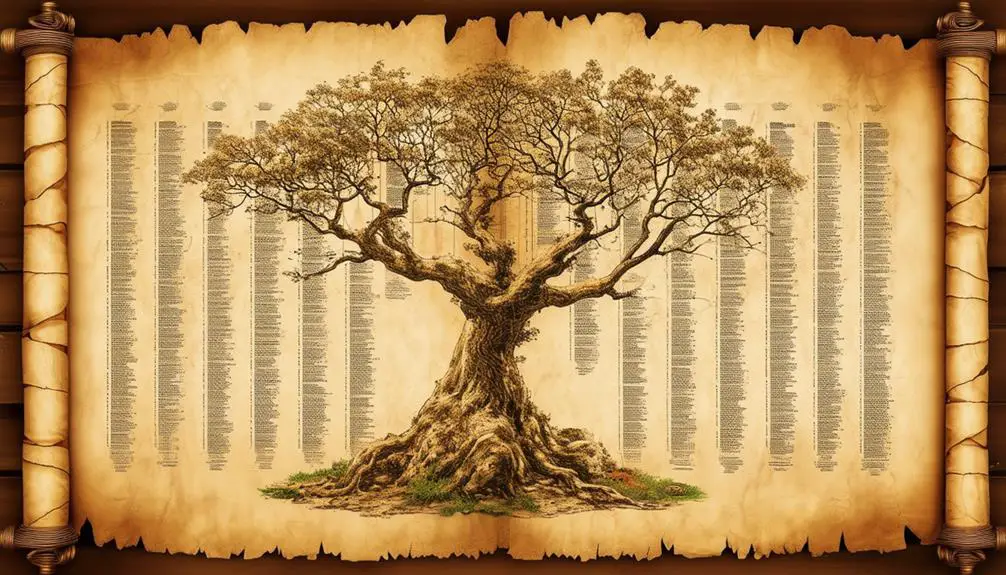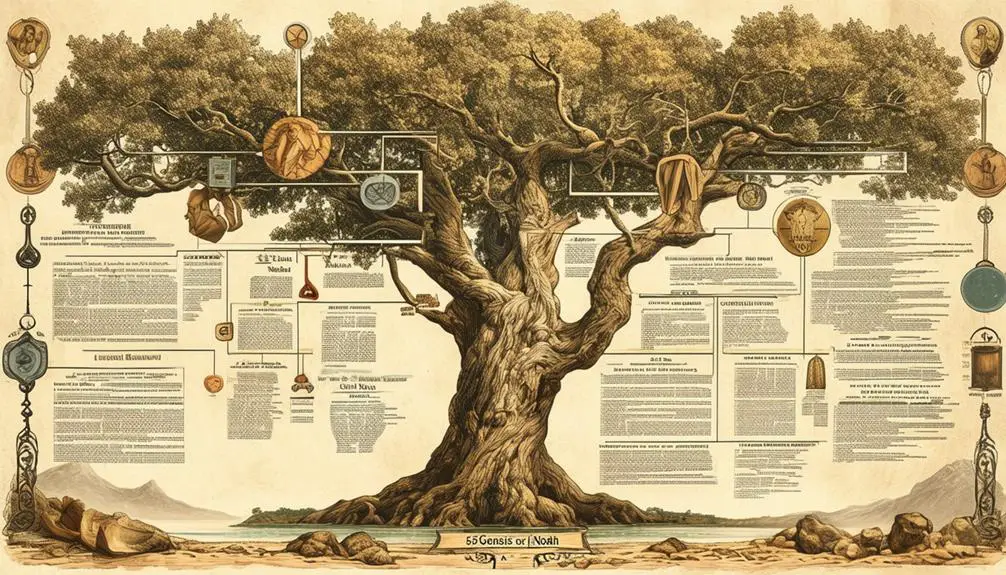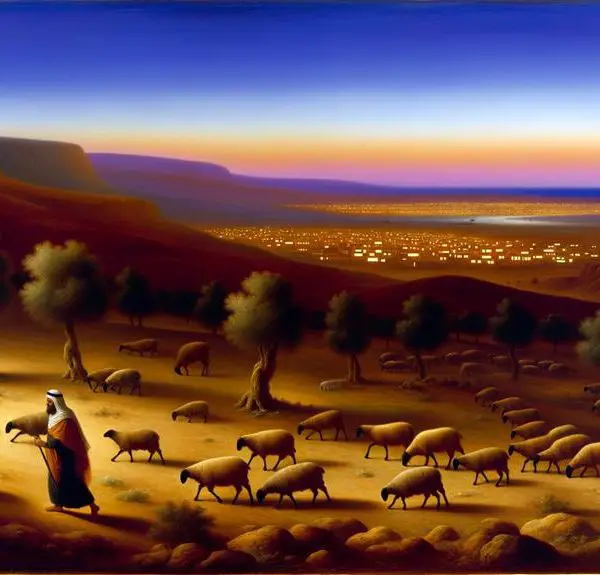Marvel at the divine wisdom embedded in Genesis 5, as we navigate through lineages, longevity, and lessons on sin and redemption.

Bible Study – The Book of Genesis – Chapter 5 – Summary and Analysis
Genesis 5 provides a detailed genealogical account from Adam to Noah, documenting remarkably extended lifespans of these patriarchs. Longevity, like Methuselah's 969 years, stirs scholarly debate over literal or symbolic interpretation. The lineage contrasts righteousness from Seth's descendants with Cain's. Key figure, Enoch, is celebrated for 'walking with God', contradicting the norm of death as sin's consequence. Significant themes of divine providence, sin, redemption, God's patience and mercy emerge. The blend of historical record and theological implications enriches comprehension of early Genesis narratives. Unwrapping the intricacies of this chapter will inevitably illuminate your understanding.
Key Takeaways
- Genesis Chapter 5 provides a detailed genealogical account from Adam to Noah, emphasizing their extraordinarily long lifespans.
- Notable characters include Seth, Enoch, and Noah, each representing different aspects of righteousness and divine favor.
- The chapter sparks debate among scholars regarding the interpretation of the patriarchs' ages, particularly Methuselah's 969 years.
- Methuselah, living the longest, symbolizes God's patience before the flood and offers unique insights into the early Genesis chapters.
- Theological themes in this chapter highlight divine providence, consequences of sin, divine intervention, and the need for repentance.
Genesis Chapter 5: Overview

In examining Genesis Chapter 5, you'll find that it primarily revolves around the genealogical account of Adam's lineage, a detailed record providing profound insights into the lifespans and progeny of the first humans, according to biblical tradition. The chapter presents a Creation Chronology, outlining the generations from Adam to Noah.
It's remarkable to observe how the genealogical record meticulously calculates the ages of Adam's posterity. This serves to assert the narrative's historical reliability, a characteristic typical of the biblical genre of chronicles.
However, what's even more fascinating is the extraordinarily long lifespans recorded, with most patriarchs living several centuries. This aspect can be interpreted in various ways. Some scholars suggest it might symbolize the blessedness and divinely intended longevity of human life in its original, pre-fall state. Others propose that these ages might be symbolic, representing the moral and spiritual stature of these figures.
Notable Characters and Lineages
Delving into Adam's lineage, you'll encounter a host of notable characters whose lives and legacies shape the narrative of Genesis. This Divine Genealogy embedded within Genesis Chapter 5 offers profound Ancestral Insights, serving as a chronicle of humanity's early roots.
Firstly, there's Seth, Adam's son, who emerged as a pivotal figure, his birth marking a divine reset post Abel's tragic death. Seth's line, contrasting Cain's, veered towards righteousness, embodying the spiritual trajectory of mankind.
Enoch, another remarkable character, only appears briefly, yet his life resonates powerfully. Known for 'walking with God,' he was translated into heaven, bypassing death, a unique occurrence in biblical narratives. His life underscores the potential intimacy between God and humanity, providing a glimpse into divine possibilities.
The genealogical apex, however, is Noah, the tenth from Adam. He's a beacon of righteousness amidst humanity's decline. A divine choice to spearhead mankind's rebirth, Noah's life is pivotal, setting the stage for the flood narrative.
Interpretation of Ages and Lifespans

You're about to engage with the intricate subject of interpreting ages and lifespans in Genesis 5, especially the 969 years of Methuselah. This extraordinary lifespan, along with others, is ripe with symbolism and metaphoric implications. Your understanding will be deepened by an analytical exploration of these biblical narratives and their potential meanings in a historical and theological context.
Methuselahs 969 Years
Let's unpack Methuselah's remarkable lifespan of 969 years, an aspect that has stirred intense debate among scholars and theologians alike. This scholarly inquiry forms a vital part of Methuselah's Legacy and the broader theme of Age Interpretation.
Consider the following:
- Some argue that these ages are literal, asserting that early humans lived notably longer due to environmental conditions or divine intervention.
- Others view these ages symbolically, with the numbers serving as metaphors for wisdom or righteousness.
- Another theory proposes that ancient cultures used different systems of calculating ages.
Each perspective offers a unique lens through which we can explore and understand the longevity of figures like Methuselah. However, it's noteworthy that no interpretation is definitive, and the mystery of Methuselah's 969 years continues to intrigue scholars.
Symbolism in Lifespans
Often, it's suggested that the extraordinarily long lifespans recorded in Genesis, like Methuselah's 969 years, aren't literal but rather symbolic, representing wisdom or righteousness. This interpretation, steeped in the numerological significance of these lifespans, suggests that ancestral longevity is less about physical years and more about spiritual maturity. It's not simply about the number of years lived, but the quality of those years in service to God. The considerable lifespans may also reflect the ancestral longevity, a proof of the enduring legacy of these biblical figures. Hence, it's crucial to explore beyond the literal reading and examine the symbolic intent, understanding these lifespans as metaphors for spiritual growth and the impact of one's life on subsequent generations.
Methuselah: A Closer Look
Diving into the depths of Genesis 5, we encounter Methuselah, a figure whose longevity has sparked intrigue and analysis among biblical scholars. He's not just a footnote in the genealogical listings of Genesis. His life, particularly his age, holds fascinating insights into the early Biblical period.
Let's focus on Methuselah's wisdom and ancestral lineage. As per the Bible, Methuselah was the son of Enoch and the grandfather of Noah, placing him in a significant biblical lineage. He's also known for his remarkable lifespan, 969 years, the longest recorded in the Bible.
Here are three key aspects to ponder:
- Wisdom: Methuselah lived in an era when humanity was closer to its divine creation. It's plausible to assume that his wisdom was profound, potentially a reflection of his long life.
- Ancestry: His lineage ties him directly to Adam, the first man, and Noah, the survivor of the flood. This puts Methuselah at the heart of humanity's spiritual journey.
- Longevity: His long life can be seen as a sign of God's patience before the great flood.
Methuselah's life provides a unique perspective on the early chapters of Genesis, shedding light on humanity's beginnings and divine interactions.
Theological Themes and Lessons

In studying the theological themes and lessons from Genesis 5, you'll find a wealth of insight, revealing not just historical narratives, but also spiritual truths that still resonate today. One of the most prominent themes is Divine Providence, which surfaces through the genealogical record. God's providence is seen in the longevity of the antediluvian patriarchs, despite the pervasive sin in society. It reflects God's patience and merciful nature, providing ample opportunities for repentance.
Another key theological theme in Genesis 5 is the consequence of sin. The chapter presents a stark contrast between a world corrupted by sin and the longevity granted to the righteous. Here, you see the first evidence of death as a consequence of sin. Despite the extended lifespans, everyone, except Enoch, eventually dies. This shows that sin's consequences are inescapable, further emphasizing the need for divine intervention and redemption.
Analyzing the Chapter's Significance
After examining the theological themes, you might wonder about the broader significance of Genesis 5. This chapter isn't just a long list of names and ages. It's a divine genealogy that offers critical insights.
- A Thread of Divine Genealogy: Genesis 5 links Adam, created in God's image, to Noah, the man chosen to survive the world's destruction. This lineage signifies a divine plan, illustrating that God's purpose is woven through generations.
- A Mark on Creation's Timeline: The detailed ages offer a rough timeline, from Creation to the Great Flood. They help us understand biblical chronology, placing events within a larger context.
- An Evidence of Human Longevity: This chapter showcases an era when humans lived for centuries. It's a depiction of pre-Flood conditions, possibly hinting at the world's pristine state, where prolonged life was possible.
In essence, Genesis 5 is an essential piece of the biblical narrative. It's not just about who begat whom; it's about God's enduring connection to humanity, Creation's timeline, and a world vastly different from ours. Therefore, as you explore further into Genesis, remember to appreciate the significance behind each lineage and lifespan.
Frequently Asked Questions
What Is the Original Language of Genesis Chapter 5?
The original language of Genesis chapter 5 is Biblical Hebrew. Over time, through language evolution, it's been translated into numerous languages. However, translation accuracy can vary, and some nuances could be lost. It's important for you to be mindful of this when studying the text. Delving into the original Hebrew can provide deeper insight into the meanings and implications of this chapter.
Who Wrote the Book of Genesis and When Was It Written?
You're diving into the roots of Genesis, aren't you? Its author's inspiration remains a topic of debate. Traditionally, Moses is seen as the scribe, penning it around 1450-1410 B.C. However, modern scholars suggest it's a compilation of sources, pieced together much later. The composition timeline isn't concrete, but it's a fascinating exploration, isn't it? The mystery entwines itself into the text, making it even more intriguing.
Is There Any Historical or Archaeological Evidence to Support Genesis Chapter 5?
There's no concrete historical or archaeological evidence to support the genealogical accuracy or lifespan exaggeration in Genesis chapter 5. It's largely viewed as symbolic, not literal. Remember, these long lifespans could represent family lines, not individual lifetimes. It's a fascinating topic, but until more evidence surfaces, we can't definitively confirm the historical accuracy of these accounts. So, you're left to interpret it within your personal faith context.
How Does Genesis Chapter 5 Relate to Other Books in the Bible?
Genesis 5, with its ancestral lineages, weaves a thread connecting it to other biblical books. It's not just a list of names; there's symbolic significance. You'll see echoes of these lineages in Chronicles, Luke, and even Revelation. This genealogical record shows God's faithfulness across generations, reinforcing themes found throughout the Bible. It's like a tapestry, each thread contributing to the overall picture of God's plan.
Are There Different Interpretations of Genesis Chapter 5 in Various Christian Denominations?
Certainly, interpretations of Genesis chapter 5 may vary among Christian denominations. You'll find differences in the understanding of its genealogical significance and symbolic numbers. Some may see literal truths in the lifespans and lineage, while others might view these as allegorical. These differences stem from varying theological perspectives and how each denomination approaches biblical interpretation. It's fascinating how one chapter can yield such diverse understandings.



Sign up